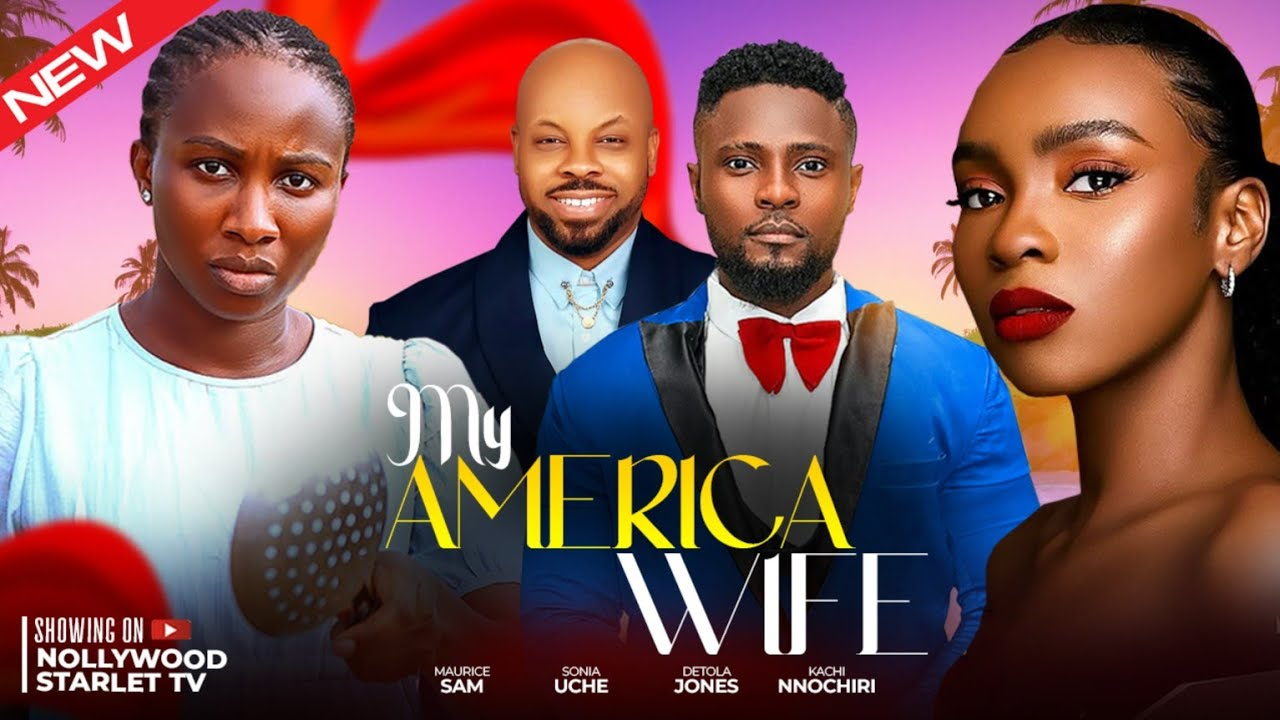Nollywood’s ‘My America Wife’: Is Felix’s Final Choice a Win for True Love or Just a Smart Business Move? A 1,500-Word Deep Dive.
The Hustle, The Heartbreak, and the High-Stakes Gamble
“MY AMERICA WIFE,” released in 2025 and showcased on Nollywood Starlet TV, is a compelling Nollywood film that delves into the complex relationships, social challenges, and the vibrant cultural tapestry of contemporary Nigerian life. Directed with a keen eye for emotional storytelling, this movie navigates themes of love, intergenerational tension, responsibility, and the pursuit of dreams amidst hardship. Combining authentic performances with relatable narratives, it continues Nollywood’s tradition of reflecting societal realities while entertaining. This detailed review unpacks the film’s plot, characters, themes, creative elements, and cultural significance, so prepare for an engaging cinematic journey.
From the moment we meet the protagonist, Felix, a cloud of societal expectation hangs over him, heavy as the Lagos humidity. His failure—the unforgivable rustication from university—isn’t just a personal setback; it’s a “wasted investment” that has turned him into the family pariah. This is the stage set for a high-stakes romantic choice. Our thesis here is simple but profound: My America Wife expertly uses a standard love triangle trope to dissect the vocational versus academic debate, concluding that while loyalty may be essential, a solid financial foundation is the necessary precondition for any Nigerian happily ever after. Let’s dive deep into the characters and the choices that make this film essential viewing.
The Burden of the Rusticated Son: Felix’s Arc
Felix is the perfect Nollywood everyman: fundamentally decent, but crippled by the lack of opportunities and the crushing weight of his family’s collective dream. His rustication didn’t just end his education; it symbolically stripped him of his societal worth. His family, led by the perpetually exasperated Auntie, sees his subsequent career as a barber—a necessary, self-taught vocational skill—not as a legitimate path, but as a temporary holding pattern before he can land a respectable, white-collar job that validates their suffering.
The genius of Felix’s arc lies in its gradual subversion of this expectation. He is a talented barber—so good, in fact, that his skill becomes his golden ticket, ironically opening the doors to the elite social circle his degree couldn’t. His journey isn’t about finding a wife; it’s about reclaiming his identity and economic agency. The ultimate romantic decision is less a choice of the heart and more the final stroke in his self-reclamation painting. The stability offered by his skill gives him the courage to choose the path of authenticity over the path of social expediency, a crucial distinction we must explore through his three suitors.
The Three Pillars of Choice: Status, Support, and Street Sense
The film’s central conflict is brilliantly defined by the three women who orbit Felix. They are not merely romantic interests; they are codified symbols of the socioeconomic realities facing young Nigerian men.
Kelly: The Compensation of Status
Kelly, the ex-classmate, is the living embodiment of the “American Wife” promise alluded to in the title (though, ironically, she only brings the prospect of status, not the actual foreign passport). She is the family’s preferred choice, the “compensation” for Felix’s academic failure. Marrying her would immediately elevate his standing—a shortcut to respectability.
What makes this subplot so rich is the irony: Kelly’s father, the high-status figure, is impressed not by Felix’s non-existent degree, but by his clean, steady hands as a barber. This narrative turn is a deliberate commentary by the filmmakers, exposing the hypocrisy of Nigeria’s status obsession. They value the symbol (the degree) but rely on the actual skill (barbering) to run their operations. Kelly represents the glittering, yet ultimately transactional, reward of social climbing. Her love is conditional on the image Felix presents.
Naomi: The Sacrificial Pillar of Support
Naomi is the classic Nollywood trope of the long-suffering, genuinely loyal lover, the woman who invests her own sacrifice into the man’s potential. Her act of lending Felix the significant ₦300k elevates her beyond a mere girlfriend; she is a co-investor in his journey. She is the quiet, reliable “pillar of life” when Felix is at his lowest.
However, the film forces us to confront a hard truth: in the Nigerian dramatic universe, loyalty and sacrifice alone are often not enough to secure the romantic lead position. Naomi’s predictable fate—to be praised for her goodness but ultimately side-lined for the more volatile, passionate choice—is a bittersweet reflection of how dramatic narratives, much like real life, often overlook quiet devotion for fireworks.
Doris: The Fierce Authenticity of the Ghetto Girl
Doris, the “Ghetto Girl” and street vendor, is the catalyst for genuine dramatic heat. She is fierce, fiercely possessive, and brutally honest, operating on a level of raw, street-smart survival captured perfectly by her market mantra, “chop one, chop two.” She is Felix’s authentic, unvarnished past, the relationship free from the taint of status anxiety.
The decision to choose Doris is the film’s emotional climax. It is the moment Felix rejects the Auntie’s aspirations and embraces his true self. Her eventual acceptance by his family—precipitated, let’s be honest, by Felix securing a comfortable financial future—is the symbolic validation that Nigerian society will forgive low social status if it is accompanied by economic success. Doris is the heart, but Felix’s newly secured job is the security deposit that makes the heart a safe investment.
The Antagonist of Aspiration: The Auntie
No Nollywood film about social pressure is complete without the overbearing, status-obsessed matriarch, and the Auntie delivers in spades. She is not evil; she is merely the physical manifestation of collective Nigerian ambition. Her continuous badgering—her obsession with “big big big big grammar” and her attempts to control Felix’s romantic life—drives the entire plot forward.
Her function is vital: she represents the societal noise that Felix must tune out to find peace. Her eventual, reluctant acceptance of Doris is a powerful moment of narrative closure, signifying that the protagonist has not just won his love, but has successfully defeated the deeply ingrained fear of failure and low social standing that his family represented.
Technical Critique: Pacing and the Power of Pidgin
At over two hours, My America Wife demands commitment, and this is where the film’s technical execution becomes a double-edged sword.
The Two-Hour Grind: Melodrama vs. Pacing
The lengthy runtime, typical of Nollywood epics, allows for thorough character development but frequently succumbs to the genre’s inherent flaw: melodramatic padding. Scenes, particularly the heated domestic quarrels and the public fights (like the memorable one involving Doris around the 01:09:09 mark), are often prolonged beyond necessity, savoring the spectacle of emotional excess. While this satisfies the core audience’s appetite for intense drama, a leaner edit could have amplified the narrative’s tension, proving that sometimes, less is more. The film is a marathon, not a sprint, and viewers must be prepared to navigate patches of slow-burn dialogue that suddenly explode into emotional conflagrations.
Dialogue and Authenticity: The Language of Class
The film’s use of dialogue is arguably its strongest technical achievement. The effortless blending of formal English with local vernacular and Pidgin English is a masterclass in code-switching as a character trait.
The Auntie’s dialogue, peppered with misplaced attempts at high-class diction, immediately marks her as striving, inauthentic, and anxious. In contrast, Doris’s blunt, visceral Pidgin dialogue cuts straight to the emotional core, grounding her in reality. The way Felix navigates these linguistic registers—speaking formally in the corporate world, using supportive English with Naomi, and reverting to the street vernacular with Doris—effortlessly signifies his movement between social classes and emotional states. The confusion surrounding the “ring” scene at 01:42:05 is a perfect microcosm of this dynamic: miscommunication fueled by social pressure.
Thematic Verdict: Was it Love, or Just Luck?
The final question hanging over My America Wife is whether Felix’s conclusion is a genuine triumph of love or merely a lucky convergence of fate.
The film strongly champions the idea that vocational skills and self-reliance—epitomized by the barber shop—are as, if not more, valuable than a failed academic pursuit. Felix’s success is a direct result of his hands-on talent, a poignant statement in a country that often devalues manual and technical trades in favor of “degrees.”
However, the conclusion is not entirely altruistic. While Felix chooses the authentic, passionate Doris, this choice is immediately preceded by him securing a high-paying job through Kelly’s father. This safety net allows him to choose love without sacrificing status. The film, in its final moments, suggests that in modern Nigeria, you can have love, but only if you have money. The true happy ending is not just the wife, but the wife plus the salary. The choice becomes emotionally safe only after the financial stability is guaranteed. This is less a fairy tale and more a realistic depiction of adult compromise: Love is great, but rent is mandatory.
Verdict and Call-to-Watch
My America Wife is a compelling, sometimes drawn-out, but ultimately deeply satisfying entry into the Nollywood canon. It leans heavily on established tropes—the dramatic fight scenes, the villainous Auntie, the sacrificing lover—but uses them to tell a modern story about redefining success on one’s own terms. Felix’s choice of Doris, while emotionally earned, is a powerful social statement on the validity of street smarts and the necessity of financial independence to support romantic freedom.
If you enjoy films that treat domestic drama with the operatic weight of high tragedy, and you want to understand the current cultural conversation around education and ambition in Nigeria, this film is a must-watch.
GO WATCH IT NOW: Come for the melodrama, stay for the nuanced social commentary on why a barber’s clipper is sometimes mightier than a university degree. You’ll be talking about Team Doris versus Team Naomi for weeks!
#NollywoodTimes
#MyAmericaWifeMovie
#NollywoodMovies
#NaijaDrama















Leave a Reply